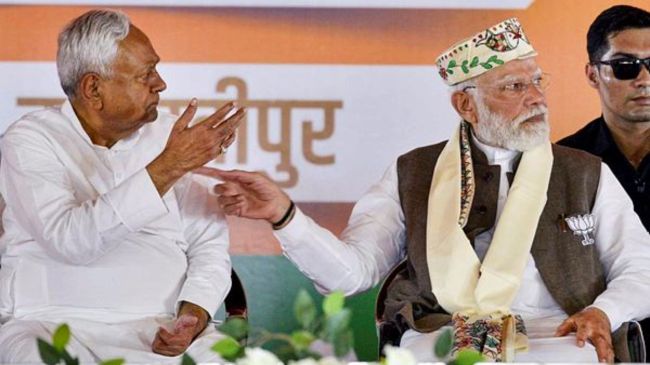5 key takeaways as PM Modi begins Bihar poll campaign from Samastipur: Invoking Karpoori Thakur’s legacy to fear of ‘jungle raj’ return
PM sets the tone for the battle for Bihar, addressing his first rally a few kilometres from the former Bihar CM and socialist icon's village
 Prime Minister Narendra Modi, right, and Bihar Chief Minister Nitish Kumar during a public meeting ahead of the state Assembly elections, in Samastipur district, on Friday. (PTI photo)
Prime Minister Narendra Modi, right, and Bihar Chief Minister Nitish Kumar during a public meeting ahead of the state Assembly elections, in Samastipur district, on Friday. (PTI photo) Kicking off the Bihar Assembly election campaign from Samastipur in Bihar’s Mithila region Friday, Prime Minister Narendra Modi sought to weave together the discourses of social justice, development and Hindutva, while at the same time cautioning people not to let “jungle raj” return to the state. He also sought to tacitly answer the charge of the opposition that the BJP had fought shy of declaring Nitish Kumar as the chief ministerial candidate because it wanted to replace him after the elections, without overtly naming Kumar the CM candidate.
The PM’s choice to begin with Samastipur is significant as the BJP has attempted to co-opt the socialist legacy of former CM Karpoori Thakur, who was conferred the Bharat Ratna last year by the NDA government. Before the public meeting, the PM visited Thakur’s paternal village Karpoori Gram (named after the socialist leader following his death in 1988), which is barely a few kilometres from the rally venue in Samastipur town.
Here are the key takeaways from the speech:
Social justice pitch
In what made for good optics, the PM began his Samastipur outing by paying tribute to Karpoori Thakur who in 1978 implemented the Mungerilal Commission report to provide separate quotas to the Other Backward Classes (OBCs) and the Extremely Backward Classes (EBCs).
“I went to Karpoori Gram before coming here. I got a chance to pay my tributes to him. It is due to his blessings that people like me and Nitish ji coming from backward and poor families are on this stage,” the PM said later. “In independent India, in attempts to bring social justice, his role was very big. We had the good fortune of awarding him with Bharat Ratna. He was our inspiration. He gave primacy to the backward and the poor. We have drawn inspiration from him.”
Modi said the NDA government had given primacy to OBCs, EBCs, Dalits, Mahadalits, and the poor in the general category. The PM said the all-India quota for medical education earlier did not have reservation for the backwards and the poor, adding that the NDA government introduced this provision. He added that the NDA granted constitutional status to the OBC Commission. Underlining that Thakur was a votary of education in the mother tongue, he said the new education policy of his government had ensured this.
A balancing act
Modi repeatedly referred to the NDA in his speech, taking care not to assert the primacy of the BJP in a state where the support of the Janata Dal (United) is crucial. However, while acknowledging Nitish’s leadership and repeatedly praising the work done by him, he chose to talk about an impending “NDA sarkar” rather than a “Nitish sarkar”.
“The whole of Bihar is saying: ‘Phir ek baar, NDA sarkar; phir ek baar sushasan sarkar; jungle raj waalon ko, door rakhega Bihar (Once again, NDA government; once again good governance government; Bihar will keep jungle raj out),” Modi said.
He recounted the Assembly election wins of the NDA across states, adding that “even this time, under the leadership of Nitish babu”, the NDA was going to break records. This seemed a tacit answer to RJD leader Tejashwi Yadav’s attack that the NDA had not yet declared Nitish as its CM candidate.
Reminder about ‘jungle raj’
Combining law and order, corruption, and social justice in his attack on the Opposition Mahagathbandhan, Modi said, “The RJD and Congress … people are those on bail in scams running into thousands of crores. Now they are trying to steal the title Jan Nayak (people’s hero, a veiled reference to the Congress campaign on Rahul Gandhi). People of Bihar will never tolerate this insult to Jan Nayak Karpoori Thakur.”
He added, “It was in October 2005 that Bihar was liberated from jungle raj and the good governance of Nitish ji began. But for the next 10 years, the Congress at the Centre tried to keep Bihar backward. They were taking revenge on you for voting for the NDA. The RJD would also pressure the Congress not to give any project to Bihar. With all our allies, Nitish ji is working day and night … A new era of development has begun. The NDA government at the Centre has given three times the funds to Bihar compared to the UPA government.”
Modi asked the crowd to switch on their mobile torch, and when large numbers of people did so, he quipped, referring to the poll symbol of the RJD, “Itni light hai, har ek ke haath mein light hai, toh lalten chahiye kya? Bihar ko lalten aur unke saathi nahin chahiye (There is so much light, and in each hand, so does Bihar need the lantern? No, it does not).”
He said the gates of police stations were closed for Dalits and the poor during “jungle raj”, recalling crime and Maoism. He said once the NDA got the chance in 2014, he vowed to put an end to the Naxal insurgency and added that “just as Maoism had ended in Bihar, it would soon end in India as a whole”. Modi said the Opposition’s campaign showed they intended to bring back “jungle raj” as “they were moving with pistols and rifles”.
Development pitch
Modi said fish production in Bihar had doubled under the NDA government and also referred to the Makhana Board that the Centre announced in the last Budget, calling it a revolution. He also read out the names of his government’s various schemes, seeing in these the seeds of both social justice and development, and emphasised the work happening on road infrastructure in the state.
He said that Bihar women had received Rs 10,000 and that he had heard that women here had already used this money during the festival season to make earthen lamps and eatables.
The dream of every Bihari is “Modi’s sankalp”, the PM said. He added that the RJD and Congress were interested only in their families. Accusing the RJD and the Congress of spreading canards against the NDA, he said the youth of Bihar knew all “gunaa bhaag (calculation)”, as the state was the land of Aryabhatt and would not be misguided.
Hindutva plus caste references
Referring to the widespread belief that Sita, the wife of Lord Ram, was from the Mithila region, the PM said, “Your son-in-law is Lord Ram himself. So, when the Ram temple was built in Ayodhya, people in Mithila were very happy.”
He said new temples of Maharishi Valmiki and Nishad Raj had also come up near the Ram temple in Ayodhya. This was a tacit attempt to reach out to sections of Dalits and EBCs. While the Valmiki Dalits consider themselves the descendants of Valmiki, who is believed to have authored the Ramayana, the Nishad Raj reference was aimed at the Mallahs, an EBC caste represented by Vikassheel Insaan Party leader Mukesh Sahani, now the Opposition’s Deputy CM face.



